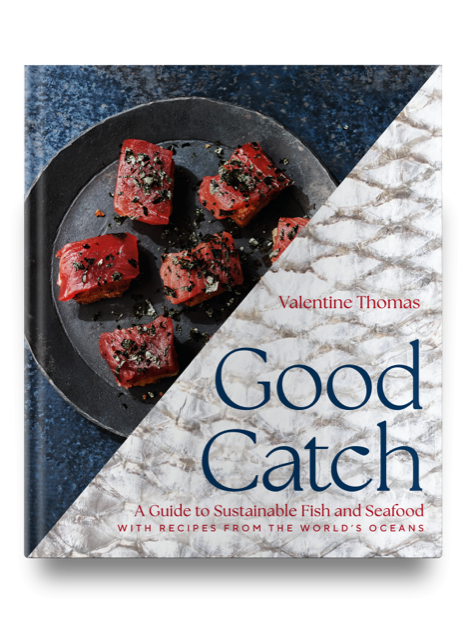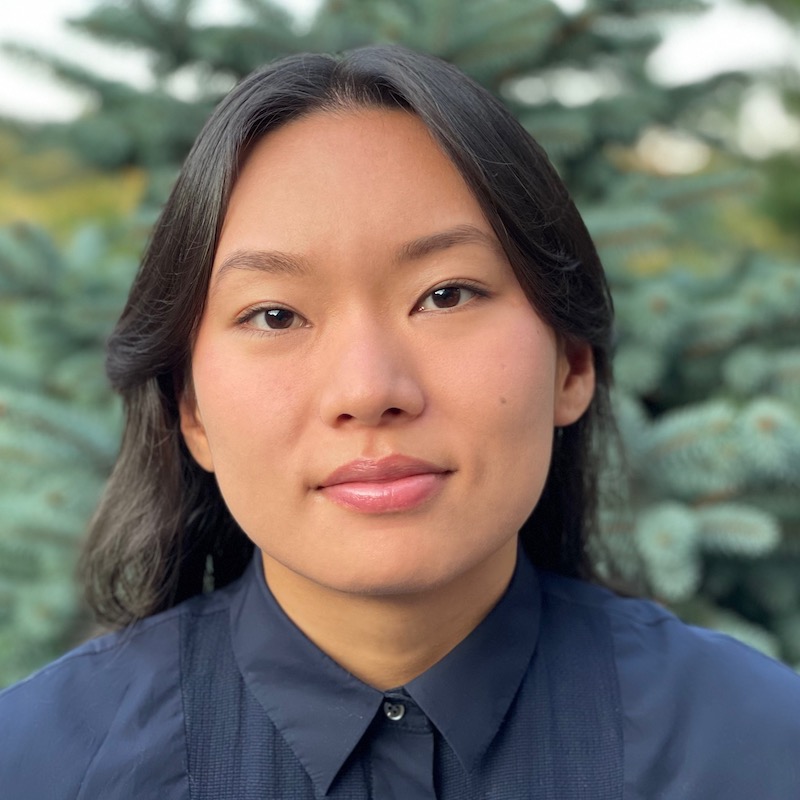
Valentine Thomas, professional spearfisherwoman, sustainable seafood advocate and author of the new cookbook, Good Catch: A Guide to Sustainable Fish and Seafood with Recipes from the World's Oceans. (Image credit: ©Andrew Thomas Lee)
Valentine Thomas sees the fishing industry firsthand on her dives around the world. The professional spearfisherwoman and sustainable seafood advocate’s latest cookbook, Good Catch: A Guide to Sustainable Fish and Seafood with Recipes from the World's Oceans, will publish on May 16. The book offers not only seafood recipes inspired by her travels, but also a thorough definition of sustainable fishing and insight on the impact of seafood sourcing beyond the water.
While technically a cookbook, Good Catch combines recipe, anecdote, reflection, and scientific analysis into a robust quilted perspective on eating from the water. The book’s refusal to bend to genre constraints delivers a whole-system awareness of fishing practices and an approachable guide to selecting seafood.

The preface details how Thomas thought little about her own seafood sources before her first dive. “I picked my fish based on just what looked the best and was the cheapest, basically,” Thomas remembered in an interview with TriplePundit.
Born in Quebec, Thomas studied criminal law and worked in finance before accepting an invitation to her first spearfishing dive from an acquaintance while traveling. Since then, she quit her corporate job and dedicated most of her time and professional life to hunting 170 feet below the water’s surface. Spearfishing often involves free-diving, the practice of holding one’s breath underwater — in Thomas’ case, up to six minutes at a time before surfacing — without the aid of oxygen tanks. Spearfishing with scuba equipment or other oxygen aids is banned in many waters, in large part to protect marine biodiversity.
The seafood sourcing conversation mirrors sustainable agriculture
Good Catch also notes the particularities of aquaculture while emphasizing that “the discussion we need to have about better sourcing practices and conservation… [is] no different, really, from how lots of us have been talking about fruits and vegetables.”
Conversations around overfishing parallel those around crop rotation and soil depletion. Overfishing, when the rate of fishing exceeds the rate of fish reproduction needed to maintain a healthy population, destabilizes species populations and risks affecting the entire food web within the biome. These effects, of course, foreshadow human and industrial consequences.
For example, Canada’s Grand Banks cod fishery collapsed due to overfishing in 1992, and more than 35,000 plant workers and fishers from over 400 coastal communities lost their jobs. Programs like the Marine Stewardship Council (MSC) developed largely in response to such catastrophes to oversee commercial fisheries and establish nationally and internationally accepted fisheries management and science.
Good Catch decodes which sustainability certifications to look for when buying seafood: “These include the MSC, the Aquaculture Stewardship Council (ASC), Best Aquaculture Practices (BAP), and Seafood Watch. Only wild-caught products that come from fisheries certified according to scientific sustainability criteria will display them.”
Sharing success stories with context to inspire action
In keeping with her book, Thomas also advocates for a shift in narrative around marine health, from a focus on what’s going wrong to success stories that often inspire actionable change more effectively. “When it comes to wild fisheries, everybody should learn from the U.S., Denmark, Australia and New Zealand, who are really the leaders when it comes to sustainable seafood. The problem is that the U.S. imports about 98 percent of its seafood, [but the country] is a leader when it comes to protecting its water — it’s super fishy.”
The book adds nuance to common sourcing and nutrition misconceptions, including that farmed fish is inherently unsustainable. The environmental impact of aquaculture and farmed seafood depends on many factors, including the farm’s waste discharge, species, impact on surrounding ecosystems and quality of life.
Considering different regions’ and countries’ fishing context — cultural significance, natural resources, trade and more — develops a more realistic, compassionate understanding of environmental impact. Thomas recalled diving in Zanzibar in her early 20s and feeling critical of a local’s fishing practices. A local said, “‘Look, girl, I don't have money to feed my family. I'm going to do everything I can to bring food to my kids and wife.’ He was telling me about the fishing fleets from other countries and said, ‘What am I supposed to do?’ That's when I understood.”
Expect entrees with global insights
Good Catch sorts 75 stunning recipes into 14 regional chapters, from Mexico to Sweden to New Caledonia. Each chapter is prefaced by and garnished with Thomas’ vibrant insights from dives in each locale. Florida’s recipes — like Swordfish Eggs Benedict with Dill Hollandaise or Baby Scallop Ceviche with Kohlrabi and Pineapple — come with accounts of catching invasive species like lionfish and how certain species that are less conducive to commercial fishing become grocery store rarities.
Taiwan’s chapter — amid dishes like Crab Dumplings in Dashi and Whitebait Chips with Yuzu-Tarragon Mayo — recall how Thomas and the Taiwanese Sustainable Fishing Association submitted alternative spearfishing regulations to the Ministry of Environment and Fisheries’ proposed ban. Their accepted proposal, which includes commercial fishing regulations, strategies to improve fish stocks and efforts to educate the public, preserved many local families’ main access to food and addressed the actual problem of commercial overfishing.
Good Catch may initially hook readers with its richly detailed dishes and guide to smart seafood selection. But Thomas’ steadfast, inquisitive love for life underwater imparts lessons beyond the ocean.
“Having a true conversation about food sourcing will offend a lot of people,” she said. “What can we do instead of calling each other pieces of shit because somebody's eating a steak, or patting each other on the back because we shared a campaign about saving the turtles? Realistic conversations are how we're going to evolve as a species.”

Michelle is a freelance writer with experience in international nonprofit work, arts and culture writing, and creative copywriting. She is particularly devoted to stories that highlight cultural expansion and our interdependence.














